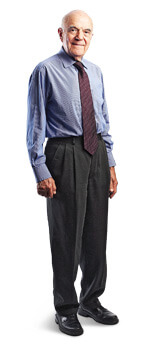Is retirement overrated?
Images of smiling silver-haired couples on sun-kissed beaches don’t reflect reality. Today, retirement is not about a permanent vacation: it’s about having control over your time.
Advertisement
Images of smiling silver-haired couples on sun-kissed beaches don’t reflect reality. Today, retirement is not about a permanent vacation: it’s about having control over your time.
 Dr. Luigi Casella is 82 but has never been more passionate about teaching cardiology: “I’m doing something that is really crowning what I’ve wanted to do all my life.” On the other hand, Sylvia Stafford is just 59 but only too happy to have retired in April from her career as a clerk and transit driver. “Retirement is underrated,” she asserts. “We’re so scared of not having enough that we work ourselves to death.”
So which is it? Is retirement overrated, or should we all be striving to get there sooner? The answer depends on your personal situation but also on how you define “retirement.”
Increasingly, the traditional pattern of retiring full-stop at age 65 to live a life of pure leisure has become outdated. Instead, people want more flexibility—the option to continue working part-time. It’s about staying engaged in a range of activities that enrich mind, body and soul—and maybe your wallet, too, if you need the money.
Advertisements showing smiling retired couples walking along beaches or playing golf may be too limiting. “People are pretty savvy,” says retirement expert Lee Anne Davies, who consults on financial issues of aging. “They know it’s not the ‘great vacation.’ The biggest thing they’re interested in is having control over their own time,” she says. “They often want some time away from work but still want a sense of fulfillment.”
Dr. Luigi Casella is 82 but has never been more passionate about teaching cardiology: “I’m doing something that is really crowning what I’ve wanted to do all my life.” On the other hand, Sylvia Stafford is just 59 but only too happy to have retired in April from her career as a clerk and transit driver. “Retirement is underrated,” she asserts. “We’re so scared of not having enough that we work ourselves to death.”
So which is it? Is retirement overrated, or should we all be striving to get there sooner? The answer depends on your personal situation but also on how you define “retirement.”
Increasingly, the traditional pattern of retiring full-stop at age 65 to live a life of pure leisure has become outdated. Instead, people want more flexibility—the option to continue working part-time. It’s about staying engaged in a range of activities that enrich mind, body and soul—and maybe your wallet, too, if you need the money.
Advertisements showing smiling retired couples walking along beaches or playing golf may be too limiting. “People are pretty savvy,” says retirement expert Lee Anne Davies, who consults on financial issues of aging. “They know it’s not the ‘great vacation.’ The biggest thing they’re interested in is having control over their own time,” she says. “They often want some time away from work but still want a sense of fulfillment.”

 If you’re like Sylvia Stafford and have a workaday job that’s starting to make you weary, retiring permanently may be attractive—if you can afford it. But you will probably want to make it an active, stimulating, social retirement that provides compelling reasons to jump out of bed in the morning.
When it comes to money, people increasingly want financial independence, which is not the same as the traditional objective of amassing enough wealth to quit work entirely. Call it “findependence,” to use a term coined by MoneySense editor Jonathan Chevreau, or “freedom money” in the words of Chris Brown, principal with Hearts & Wallets LLC, a U.S. market research firm specializing in retirement issues.
“People don’t necessarily want money to retire, but they want money to take control and have choices,” says Brown. Many older workers want the option of being able to keep working, while not being compelled to. Brown says some describe this as having “F-you money,” evoking the satisfying fantasy of telling off an unreasonable boss without fear of financial consequences.
Research suggests only a third of the workforce aspires to a total-leisure retirement that has no work component at all, Brown says. Older people “like the idea of ‘freedom money’ and don’t necessarily like the life of leisure. Among younger people I think they look at it and say, ‘There’s no way we’re going to be able to afford the life of leisure anyway.’” Even if they could afford it, the very idea turns off a big chunk of the population, Brown says. “The individual looks at that, saying ‘There’s no way. This isn’t even what I want.’”
If you want to quit your career job…
If you’re like Sylvia Stafford and have a workaday job that’s starting to make you weary, retiring permanently may be attractive—if you can afford it. But you will probably want to make it an active, stimulating, social retirement that provides compelling reasons to jump out of bed in the morning.
When it comes to money, people increasingly want financial independence, which is not the same as the traditional objective of amassing enough wealth to quit work entirely. Call it “findependence,” to use a term coined by MoneySense editor Jonathan Chevreau, or “freedom money” in the words of Chris Brown, principal with Hearts & Wallets LLC, a U.S. market research firm specializing in retirement issues.
“People don’t necessarily want money to retire, but they want money to take control and have choices,” says Brown. Many older workers want the option of being able to keep working, while not being compelled to. Brown says some describe this as having “F-you money,” evoking the satisfying fantasy of telling off an unreasonable boss without fear of financial consequences.
Research suggests only a third of the workforce aspires to a total-leisure retirement that has no work component at all, Brown says. Older people “like the idea of ‘freedom money’ and don’t necessarily like the life of leisure. Among younger people I think they look at it and say, ‘There’s no way we’re going to be able to afford the life of leisure anyway.’” Even if they could afford it, the very idea turns off a big chunk of the population, Brown says. “The individual looks at that, saying ‘There’s no way. This isn’t even what I want.’”
If you want to quit your career job…
To continue reading David Aston’s article, “Is retirement overrated?” including sections on flexible work options and how to manage your time in retirement, download the Retirement 100 | Fall 2012 package. The download includes a spreadsheet of Norm Rothery’s top dividend-paying stocks. Or pick up a copy of the November 2012 issue of MoneySense magazine on newsstands now through mid November. You can also buy digital editions of the magazine for the iPad.
Share this article Share on Facebook Share on Twitter Share on Linkedin Share on Reddit Share on Email